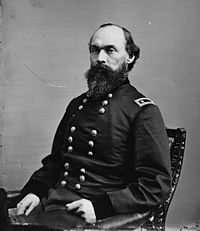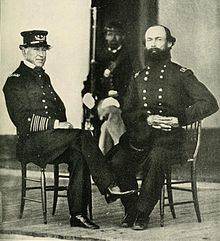- Gordon Granger
-
Gordon Granger 
Gordon Granger, photo taken during American Civil WarBorn November 6, 1822
Joy, Wayne County, New YorkDied January 10, 1876 (aged 53)
Santa Fe, New MexicoPlace of burial Lexington Cemetery Allegiance United States of America
UnionService/branch United States Army
Union ArmyYears of service 1845–76 Rank Major General Commands held Army of Kentucky
IV Corps
XIII Corps
Department of Texas
District of New MexicoBattles/wars Mexican-American War
- Battle of Wilson's Creek
- Battle of New Madrid
- Siege of Corinth
- Battle of Chickamauga
- Battle of Missionary Ridge
- Battle of Mobile Bay
- Battle of Fort Blakely
Gordon Granger (November 6, 1822 – January 10, 1876) was a career U.S. army officer and a Union general during the American Civil War. He distinguished himself at the Battle of Chickamauga.
Contents
Early life & Mexico
Granger was born in Joy, Wayne County, New York, in 1822. He graduated from the United States Military Academy in 1845.[1] During the Mexican-American War, he fought in Winfield Scott's army. Between wars, he served on the western frontier.
Civil War service
Granger's first fight in the Civil War was the Union defeat at Wilson's Creek, Missouri, in August 1861, where he was in command of a volunteer regiment of cavalry. He was promoted to brigadier general of volunteers on March 26, 1862, and commanded the Cavalry Division in the Army of the Mississippi during the Battle of New Madrid and the Siege of Corinth. He was promoted to major general of volunteers on September 17, 1862, and took command of the Army of Kentucky. He conducted cavalry operations in central Tennessee before his command was merged into the Army of the Cumberland, becoming the Reserve Corps.[1]
He is most famous for his actions commanding the Reserve Corps at the Battle of Chickamauga. There on September 20, 1863, the second day of the battle, he reinforced, without orders, Major General George H. Thomas's XIV Corps on Snodgrass Hill. This action staved off the Confederate attackers until dark, permitting the Federal forces to retreat in good order and helping earn the sobriquet "Rock of Chickamauga" for Thomas.
Granger's success at Chickamauga earned him command of the newly formed IV Corps in the Army of the Cumberland. Under his command, this force distinguished itself at the third Battle of Chattanooga. Two of the IV Corps' divisions, those commanded by Thomas J. Wood and Philip Sheridan, were among the force of units that assaulted the reinforced center of the Confederate line on top of Missionary Ridge. There, the Union forces broke through and forced the Confederates, under General Braxton Bragg, to retreat. After Chattanooga, Granger took part in lifting the siege at Knoxville, Tennessee. Despite these successes, his outspokenness prevented him from gaining more prominent commands. Nevertheless, he was sent to the Department of the Gulf, and continuing to lead troops and gain recognition. He commanded the land forces that captured Forts Gaines and Morgan in conjunction with the Union naval victory at the Battle of Mobile Bay. Granger commanded the XIII Corps during the Battle of Fort Blakely, which led to the fall of the city of Mobile, Alabama.
Postbellum
When the war ended, Granger remained in the Army, and was given command of the Department of Texas.[2] On June 19, 1865 in the city of Galveston he declared the institution of slavery dead in the state, setting off joyous demonstrations by freedmen and originating the annual "Juneteenth" celebration, which commemorates the freeing of the blacks in Texas.
In 1876, Granger died in Santa Fe, New Mexico, where he was serving in command of the District of New Mexico. He is buried at Lexington Cemetery in Kentucky.[1]
See also
Notes
References
- Dupuy, Trevor N., Curt Johnson, and David L. Bongard. The Harper Encyclopedia of Military Biography. New York: HarperCollins, 1992. ISBN 978-0-06-270015-5.
- Eicher, John H., and David J. Eicher. Civil War High Commands. Stanford, CA: Stanford University Press, 2001. ISBN 0-8047-3641-3.
External links
- "Gordon Granger". Find a Grave. http://www.findagrave.com/cgi-bin/fg.cgi?page=gr&GRid=5894120. Retrieved August 18, 2010.
Military offices Preceded by
noneCommander of the IV Corps
October 10, 1863 - April 10, 1864Succeeded by
Oliver O. HowardCategories:- United States Army generals
- 1822 births
- 1876 deaths
- People from New York
- People of New York in the American Civil War
- Union Army generals
- United States Military Academy alumni
Wikimedia Foundation. 2010.

